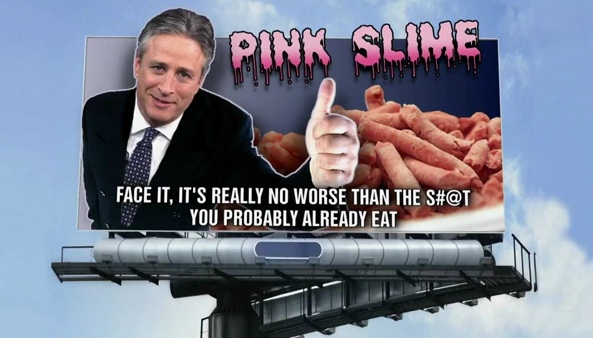 Political fodder is comedic gold.
Political fodder is comedic gold.
Satirists, like others, also eat.
Jon Stewart loves cheeseburgers.
The ingredients of public outrage over pink slime melded like a savory stew last night on the Daily Show to produce a potpourri of insights on how not to chat with people who eat.
And it was so easy because the politicians and industry seem so hapless.
U.S. Secretary of Agriculture Tom Vilsack and Iowa Governor Terry Branstad held a press conference in Des Moines Wednesday afternoon to address concerns and educate the public about the processing of lean, finely textured beef, or LFTB.
"That’s why we’re going to have people from Iowa State University and Texas A&M and knowledgeable people from USDA (U.S. Department of Agriculture) counter the smear and counter the misinformation with the facts," said Iowa Gov. Terry Branstad.
Facts are never enough. Otherwise rBST would be routinely used in dairy production, genetically-engineered foods would be flaunted not shunned, and irradiation would make pink slime redundant.
Science is never enough in the public arena.
Vilsack, a former Iowa governor, said education is especially important when a growing number of people are increasingly farther removed from agriculture.
"The reality is a very small percentage of America’s population produces 85% to 90% of what we consume.”
I’m not sure what being a beef farmer has to do with meat processing that involves centrifuges.
Stewart reasoned, "any food can be disgusting if you take its ingredients out of context." Perhaps the same thing was true of pink slime burgers?
Stewart cut to an animated news report that explained the process for making pink slime: Waste trimmings are gathered, simmered at low heat to make it easier to separate fat from muscle, then put into a  centrifuge, sprayed with ammonia gas to kill bacteria, compressed into bricks, flash-frozen and finally shipped to grocery stores nationwide, where it’s added to ground beef. Yummy!
centrifuge, sprayed with ammonia gas to kill bacteria, compressed into bricks, flash-frozen and finally shipped to grocery stores nationwide, where it’s added to ground beef. Yummy!
He also expressed his admiration for the beef industry’s preferred nomenclature, "lean, finely textured beef." "It makes it sound like something rich beef-eaters can buy from Hammacher Schlemmer," Stewart said. "It’s the cashmere of beef."
Stewart also marveled at the irony of pink slime: "McDonald’s doesn’t think it’s an appropriate thing to eat? These are the people who molded a pork disc into a rib-shaped sandwich … that contains no ribs. Nobody knows how they did it! But this stuff, pink slime? That’s too fake for McDonald’s?"
I can provide references for everything I say – that educating people is about the worst communications strategy because it invalidates and trivializes people’s thoughts. But that stuff is boring.
Stewart says the same thing but in a way that is much more entertaining.
Whenever a group says the public needs to be educated about food safety, biotechnology, trans fats, organics or anything else, that group has utterly failed to present a compelling case for their cause. Individuals can choose to educate themselves about all sorts of interesting things, but the idea of educating someone is doomed to failure. And it’s sorta arrogant to state that others need to be educated; to imply that if only you understood the world as I understand the world, we would agree and dissent would be minimized.
Or as Stewart said, “You got rid of it because we found out it was pink slime.”
Proponents of pink slime or any other technology shouldn’t expect consumers to roll over and accept it. They need to promote, brag and saturate microbial food safety claims in the marketplace. Otherwise, any farmer, processor or restaurant can be held hostage by a mere accusation – regardless of the science.
Shoppers will support honest information, instead of being told they have to become better educated  about someone else’s limited perspective.
about someone else’s limited perspective.
The Daily Show segment is available for U.S. viewers at http://www.thedailyshow.com/watch/wed-march-28-2012/march-28–2012—pt–2.
